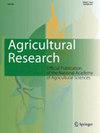Adoption of Drought-Tolerant Teff and Its Welfare Effect in Rainfall Stress Region, Northern Ethiopia
Abstract
Technological change in agriculture in climate risk-exposed developing countries is required for at least two reasons. First, increased climate risk increases the need for new agricultural technologies that are more robust to such variability. Second, the need to feed the growing population creates the need for land-use intensification. The purpose of this study is to assess technological change in terms of the adoption and intensity of drought-tolerant teff use and its impact on farm households’ welfare in a semiarid economy of northern Ethiopia. Determinants of the adoption and extent of adoption of drought-tolerant teff are estimated using correlated random effect double-hurdle models. A control function approach was used to fix the endogeneity associated with access to technology. Household fixed-effect model is used to estimate welfare impact of area used for drought-tolerant teff. The results show that although the adoption of drought-tolerant teff is access constrained, it contributes significantly to household welfare. Strengthen distribution effort of the technology in the rainfall stress areas would have an implication on food security and emerging a resilient farming system.

 求助内容:
求助内容: 应助结果提醒方式:
应助结果提醒方式:


